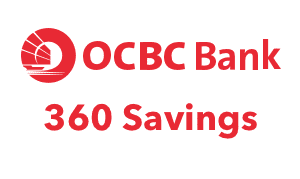The OCBC 360 Salary Bonus is a well-thought-out system that incentivizes consistent financial behavior, not just another banking perk. All you have to do is deposit your pay into an OCBC 360 account to start earning bonus interest that increases as you do more. For working people, the bank has transformed a routine transaction into a lucrative, disciplined savings plan that feels incredibly successful.

A minimum of S$1,800 must be credited each month in order to be eligible for this bonus. If they are properly labeled as “GIRO-SALARY,” “SAL,” or “SALARY,” this can occur in a single transaction or in several compensation payments. Because only those particular transaction descriptions are eligible, OCBC is quite explicit about this requirement. It’s a smart step that guarantees the benefit is activated only by certified salaries and not by sporadic transfers or checks.
Key Details of OCBC 360 Salary Bonus
| Account Name | OCBC 360 Account |
|---|---|
| Bank | Oversea-Chinese Banking Corporation (OCBC) |
| Minimum Salary Credit | S$1,800 per month |
| Qualifying Codes | GIRO-SALARY, SALARY, SALA, SAL |
| Maximum Annual Interest | Up to 5.45% per annum |
| Minimum Monthly Balance | S$3,000 (S$2 fee if below) |
| Bonus Categories | Salary, Save, Spend, Insure, Invest |
| Contact | 1800 363 3333 |
| Reference | www.ocbc.com |
It’s very easy to set up the account as the location where your salary is credited. The rest will take care of itself as soon as you give your OCBC 360 account number to your HR department. The way this approach fits into the modern employee’s schedule is especially effective; it’s simple yet fulfilling.
The multi-tiered bonus structure of the OCBC 360 structure is what makes it so attractive. In addition to salary credit, you can earn more interest by increasing your savings, using OCBC credit cards for purchases, getting insurance, or making bank investments. Engagement is the foundation of this ecosystem, and every financial transaction adds a new level of advantage. In this sense, OCBC’s strategy is quite similar to frequent flyer or rewards programs in that your return increases with your participation.
However, OCBC provides observable cash development in contrast to the majority of reward programs that offer points or discounts. Compared to standard savings accounts, the return structure can be substantially higher, reaching up to 5.45% annually. Because it converts sound financial practices into quantifiable profits, its design is especially inventive. The bank successfully rewards attentiveness, a quality that is sometimes lacking in contemporary money management, by promoting regular saving and spending discipline.
One notable example of a mix between traditional savings and a performance-based portfolio is the OCBC 360 account. It feels like a really flexible setting for young professionals. By bridging the gap between daily banking and wealth creation, it advances the notion that salaries are for more than just spending; they are also for constructing a wisely compounding financial foundation.
Maintaining eligibility, however, calls very meticulous planning. Monthly tracking is required for each bonus category, including pay, savings, card spending, insurance, and investment. Your interest will be significantly diminished if you miss even one. Although it can be challenging, this is also quite educational. It encourages consumers to be consistent and actively participate in their financial routines. Even though it is mild, this understanding is especially helpful in developing better financial habits.
Payroll crediting is the most basic step. Once attained, additional benefits come easily. For example, you can access higher interest levels by regularly saving money or charging at least S$500 on an OCBC credit card. Over time, these tiny behavioral reinforcements build up to provide the impression that financial gain is a gradual ascent rather than an abrupt leap.
The system does, however, have several drawbacks. If the S$3,000 minimum monthly balance is not maintained, there is a symbolic, not punitive, S$2 cost. It acts as a gentle reminder that practicing disciplined banking requires sustained dedication. Furthermore, substantial entrance requirements are necessary due to the added interest from insurance or investment categories: at least S$2,000 for protection plans and S$20,000 for investments. Despite their seeming severity, these requirements are set up to reward people who are sincere about long-term financial planning.
Additionally, bonus interest is capped at the first S$100,000 in the account. Funds only earn the base rate after that. This promotes strategic diversification by allocating excess funds to high-yield platforms or short-term investments, guaranteeing that returns are maximized. In this way, OCBC’s methodology gently teaches consumers about balance and portfolio strategy in addition to rewarding saves.
The design of the OCBC 360 account reflects a developing trend in banking: individualized incentive ecosystems that include investing, saving, and spending. It’s a part of a larger trend in consumer finance where banks are turning inactive clients into active ones. OCBC is reimagining the bank account as a living, flexible financial partner, much like Apple did when it transformed the phone into a hub for lifestyle.
Similar plans have been introduced by rivals like DBS Multiplier and UOB One in recent years, but OCBC’s transparency gives it an advantage. There is very little opportunity for misunderstanding because the qualifying requirements are very clear and the salary procedure is simple. Consumers can quickly check their eligibility and track their progress, which is a design decision that builds trust, which is far more valuable than any interest rate.
The OCBC 360 Salary Bonus feels like it was designed just for today’s professional. By adding monetary rewards to preexisting behaviors—earning, saving, and spending—it encourages them. It’s about making the ordinary better, not about promoting extravagance. The framework of the system is especially novel since it transforms routine tasks into a planned route to greater profits.
It’s important to consider the emotional component as well. A silent motivator that strengthens consistency is the sensation of accomplishment and control that comes from seeing bonus interest accrue each month. It’s a pleasant and long-lasting experience that combines financial wellbeing with everyday fulfillment.
